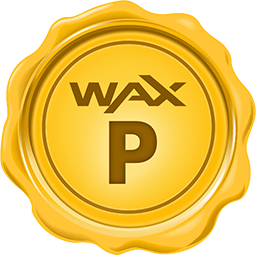-
 Bitcoin
Bitcoin $84,912.1002
0.22% -
 Ethereum
Ethereum $1,597.4099
0.99% -
 Tether USDt
Tether USDt $1.0000
0.00% -
 XRP
XRP $2.0848
1.56% -
 BNB
BNB $592.5467
0.52% -
 Solana
Solana $138.6661
3.38% -
 USDC
USDC $1.0000
0.02% -
 Dogecoin
Dogecoin $0.1597
3.32% -
 TRON
TRON $0.2416
-1.86% -
 Cardano
Cardano $0.6327
3.32% -
 UNUS SED LEO
UNUS SED LEO $9.2836
0.56% -
 Chainlink
Chainlink $12.7262
1.41% -
 Avalanche
Avalanche $19.2768
1.31% -
 Stellar
Stellar $0.2442
1.08% -
 Toncoin
Toncoin $2.9950
1.32% -
 Shiba Inu
Shiba Inu $0.0...01231
4.65% -
 Hedera
Hedera $0.1668
2.11% -
 Sui
Sui $2.1474
1.41% -
 Bitcoin Cash
Bitcoin Cash $337.5269
2.68% -
 Hyperliquid
Hyperliquid $17.5726
3.68% -
 Polkadot
Polkadot $3.7336
2.05% -
 Litecoin
Litecoin $76.5245
1.70% -
 Dai
Dai $1.0001
0.02% -
 Bitget Token
Bitget Token $4.4585
2.30% -
 Ethena USDe
Ethena USDe $0.9993
0.01% -
 Pi
Pi $0.6558
7.05% -
 Monero
Monero $214.1926
-0.69% -
 Uniswap
Uniswap $5.2567
1.90% -
 Pepe
Pepe $0.0...07325
4.28% -
 OKB
OKB $50.6926
1.82%
What is a consensus mechanism? What are the common consensus mechanisms in blockchain?
Blockchain's consensus mechanisms, like Proof-of-Work and Proof-of-Stake, ensure all nodes agree on transaction validity, preventing manipulation and maintaining a single, immutable blockchain. The choice impacts a blockchain's security, scalability, and energy efficiency.
Mar 11, 2025 at 07:30 pm

Key Points:
- A consensus mechanism is a crucial component of blockchain technology, ensuring all nodes in a network agree on the valid state of the blockchain. Without it, the blockchain would be vulnerable to manipulation and conflicting transactions.
- Several consensus mechanisms exist, each with its strengths and weaknesses regarding security, scalability, and energy efficiency. The choice of mechanism significantly impacts the blockchain's overall performance.
- Common consensus mechanisms include Proof-of-Work (PoW), Proof-of-Stake (PoS), Delegated Proof-of-Stake (DPoS), and Practical Byzantine Fault Tolerance (PBFT). Understanding their differences is crucial for evaluating different cryptocurrencies.
What is a Consensus Mechanism?
A consensus mechanism is a critical process within a blockchain network that allows all participating nodes to agree on the current and valid state of the blockchain. This is achieved despite the decentralized and distributed nature of the network, where nodes may be geographically dispersed and operate independently. Without a robust consensus mechanism, the blockchain would be vulnerable to attacks, double-spending, and conflicting transaction records. The mechanism ensures a single, immutable, and verifiable version of the blockchain is maintained. Different mechanisms employ various methods to achieve this agreement.
Proof-of-Work (PoW): The Energy-Intensive Approach
PoW, famously used by Bitcoin, relies on a computational race. Nodes compete to solve complex cryptographic puzzles. The first node to solve the puzzle gets to add the next block of transactions to the blockchain and is rewarded with newly minted cryptocurrency. This process requires significant computing power, consuming substantial energy. While secure against attacks, its energy consumption is a major drawback. The high energy cost creates environmental concerns and barriers to entry for smaller miners.
Proof-of-Stake (PoS): A More Energy-Efficient Alternative
PoS addresses the energy consumption issues of PoW. Instead of relying on computational power, PoS selects validators based on the amount of cryptocurrency they stake (lock up) in the network. The more cryptocurrency a node stakes, the higher its probability of being chosen to validate transactions and add new blocks. This process is significantly more energy-efficient than PoW. However, it can be susceptible to attacks from wealthy stakeholders who control a significant portion of the staked cryptocurrency.
Delegated Proof-of-Stake (DPoS): A Representative System
DPoS is a variation of PoS that introduces a layer of delegation. Instead of every staker validating transactions directly, users vote for delegates who act on their behalf. These delegates are responsible for validating transactions and adding new blocks to the blockchain. This system can improve scalability and transaction speed compared to traditional PoS, as only the elected delegates need to actively participate in consensus. However, the centralization of power among the delegates could be a potential vulnerability.
Practical Byzantine Fault Tolerance (PBFT): For Smaller, Private Blockchains
PBFT is a deterministic consensus mechanism suitable for smaller, private blockchains. It requires a smaller number of nodes to achieve consensus compared to PoW or PoS. Each node broadcasts its proposed block to the other nodes. If a consensus is reached within a defined time frame, the block is added to the blockchain. However, PBFT's scalability is limited, making it less suitable for large, public blockchains. Its performance degrades significantly as the number of nodes increases.
Other Notable Consensus Mechanisms:
Beyond the prominent mechanisms discussed, other innovative approaches are constantly being developed and implemented. These include Proof-of-Authority (PoA), where validators are pre-selected based on reputation or identity; Proof-of-History (PoH), which uses cryptographic hashing to establish a verifiable timeline; and various hybrid models that combine aspects of different mechanisms to optimize performance and security. Each has its own unique strengths and weaknesses depending on the specific requirements of the blockchain network.
Common Questions and Answers:
Q: What is the most secure consensus mechanism?
A: There's no single "most secure" mechanism. PoW's high computational barrier makes it very resistant to attacks, but it's energy-intensive. PoS mechanisms are generally considered more energy-efficient but can be vulnerable to attacks from large stakeholders. Security depends on the specific implementation and the overall network health.
Q: Which consensus mechanism is the most scalable?
A: DPoS and PBFT offer better scalability than PoW and PoS, especially for larger transaction volumes. However, scalability comes with trade-offs, potentially impacting decentralization and security.
Q: How does a consensus mechanism prevent double-spending?
A: Consensus mechanisms prevent double-spending by ensuring that only one valid version of the blockchain exists. Once a transaction is added to a confirmed block, it's virtually impossible to reverse or spend the same cryptocurrency twice. The consensus process validates the transaction's legitimacy and prevents fraudulent activities.
Q: What are the environmental implications of different consensus mechanisms?
A: PoW mechanisms are known for their high energy consumption, contributing to significant carbon emissions. PoS and its variations are significantly more energy-efficient, offering a more environmentally friendly alternative.
Q: Can a blockchain use multiple consensus mechanisms?
A: While less common, some blockchains experiment with hybrid approaches, combining elements of different mechanisms to leverage their individual strengths and mitigate their weaknesses. This allows for a customized solution tailored to specific network needs.
Disclaimer:info@kdj.com
The information provided is not trading advice. kdj.com does not assume any responsibility for any investments made based on the information provided in this article. Cryptocurrencies are highly volatile and it is highly recommended that you invest with caution after thorough research!
If you believe that the content used on this website infringes your copyright, please contact us immediately (info@kdj.com) and we will delete it promptly.
- Ethena Labs Unveils Converge, a New Layer-1 Blockchain Targeting Tokenized Real-World Assets
- 2025-04-19 12:20:14
- FBI Releases Five Warnings to Help Protect Investors in the Cryptocurrency Space
- 2025-04-19 12:20:14
- Today, the Official Trump ($TRUMP) meme coin tokens have been unlocked, sparking panic among investors.
- 2025-04-19 12:15:14
- Dogecoin (DOGE) Price Prediction: Will the Original Memecoin Reach $1 by Late Summer 2025?
- 2025-04-19 12:15:14
- Resilience is a Distinct Attribute of Solana
- 2025-04-19 12:10:13
- Astar Network Adjusts Its Token Issuance Model to Stabilize APY and Reduce Inflation
- 2025-04-19 12:10:13
Related knowledge
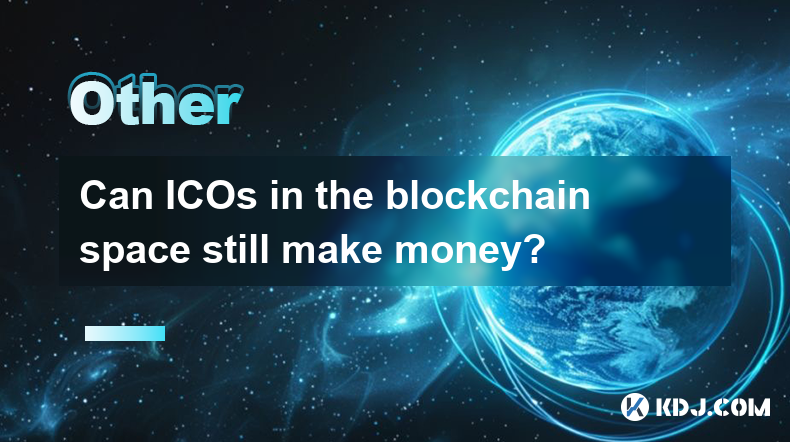
Can ICOs in the blockchain space still make money?
Apr 17,2025 at 08:29pm
The landscape of Initial Coin Offerings (ICOs) in the blockchain space has evolved significantly since their peak in 2017 and 2018. Despite the increased regulatory scrutiny and the rise of alternative fundraising methods like Security Token Offerings (STOs) and Initial Exchange Offerings (IEOs), ICOs can still be a viable way to raise funds and generat...
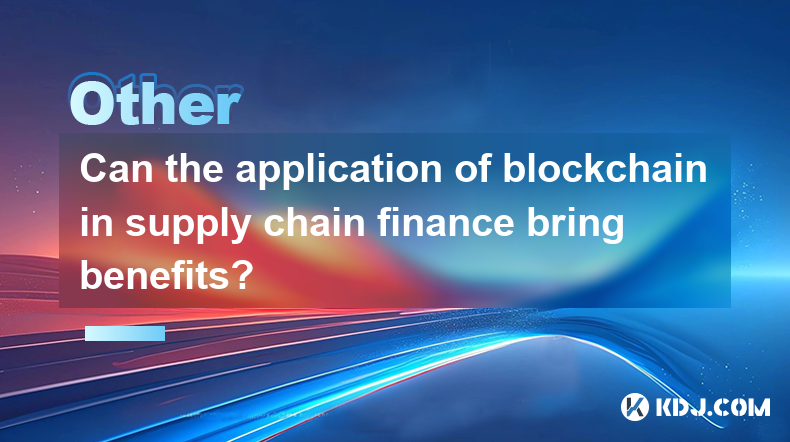
Can the application of blockchain in supply chain finance bring benefits?
Apr 15,2025 at 04:00pm
Can the application of blockchain in supply chain finance bring benefits? The integration of blockchain technology into supply chain finance has garnered significant attention in the cryptocurrency and financial sectors. This article explores how blockchain can potentially revolutionize supply chain finance, detailing its benefits and providing a compre...

Does the ranking of Chinese blockchain apps include cross-chain applications?
Apr 14,2025 at 04:00pm
The ranking of Chinese blockchain apps is a comprehensive evaluation that takes into account various aspects such as user base, transaction volume, and technological innovation. A pertinent question arises regarding whether these rankings include cross-chain applications. Cross-chain applications, which allow different blockchain networks to interact an...
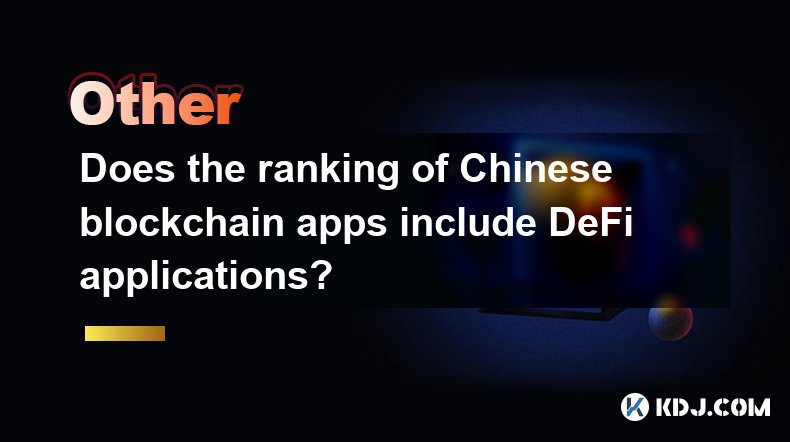
Does the ranking of Chinese blockchain apps include DeFi applications?
Apr 15,2025 at 06:57am
The ranking of Chinese blockchain apps is a comprehensive list that showcases the most popular and influential applications within the cryptocurrency ecosystem. One question that often arises is whether these rankings include DeFi applications. To answer this, we need to delve into the specifics of how these rankings are compiled and what types of appli...
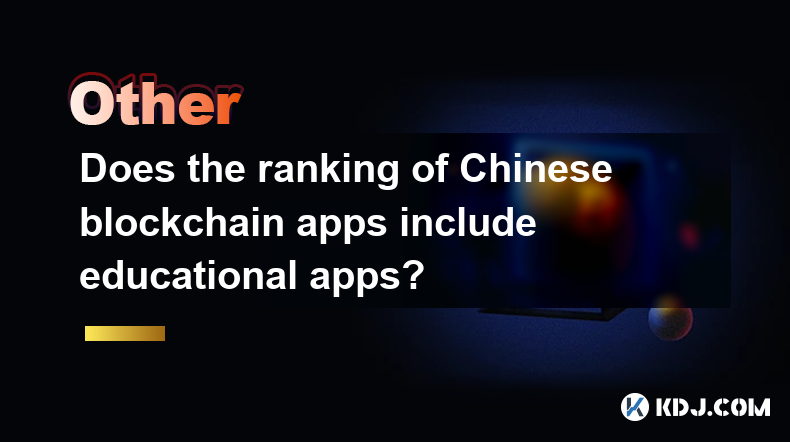
Does the ranking of Chinese blockchain apps include educational apps?
Apr 16,2025 at 03:35am
The ranking of Chinese blockchain apps often includes a variety of categories, from finance and gaming to social networking and beyond. One question that frequently arises is whether these rankings include educational apps. To address this, we need to delve into the specifics of how blockchain apps are categorized and ranked in China, and whether educat...
Does the ranking of Chinese blockchain apps include enterprise-level applications?
Apr 15,2025 at 06:42am
The ranking of Chinese blockchain apps often includes a variety of applications, ranging from consumer-focused to enterprise-level solutions. Understanding the scope and criteria for these rankings is essential to determine if enterprise-level applications are included. This article delves into the specifics of how Chinese blockchain app rankings are co...

Can ICOs in the blockchain space still make money?
Apr 17,2025 at 08:29pm
The landscape of Initial Coin Offerings (ICOs) in the blockchain space has evolved significantly since their peak in 2017 and 2018. Despite the increased regulatory scrutiny and the rise of alternative fundraising methods like Security Token Offerings (STOs) and Initial Exchange Offerings (IEOs), ICOs can still be a viable way to raise funds and generat...

Can the application of blockchain in supply chain finance bring benefits?
Apr 15,2025 at 04:00pm
Can the application of blockchain in supply chain finance bring benefits? The integration of blockchain technology into supply chain finance has garnered significant attention in the cryptocurrency and financial sectors. This article explores how blockchain can potentially revolutionize supply chain finance, detailing its benefits and providing a compre...

Does the ranking of Chinese blockchain apps include cross-chain applications?
Apr 14,2025 at 04:00pm
The ranking of Chinese blockchain apps is a comprehensive evaluation that takes into account various aspects such as user base, transaction volume, and technological innovation. A pertinent question arises regarding whether these rankings include cross-chain applications. Cross-chain applications, which allow different blockchain networks to interact an...

Does the ranking of Chinese blockchain apps include DeFi applications?
Apr 15,2025 at 06:57am
The ranking of Chinese blockchain apps is a comprehensive list that showcases the most popular and influential applications within the cryptocurrency ecosystem. One question that often arises is whether these rankings include DeFi applications. To answer this, we need to delve into the specifics of how these rankings are compiled and what types of appli...

Does the ranking of Chinese blockchain apps include educational apps?
Apr 16,2025 at 03:35am
The ranking of Chinese blockchain apps often includes a variety of categories, from finance and gaming to social networking and beyond. One question that frequently arises is whether these rankings include educational apps. To address this, we need to delve into the specifics of how blockchain apps are categorized and ranked in China, and whether educat...

Does the ranking of Chinese blockchain apps include enterprise-level applications?
Apr 15,2025 at 06:42am
The ranking of Chinese blockchain apps often includes a variety of applications, ranging from consumer-focused to enterprise-level solutions. Understanding the scope and criteria for these rankings is essential to determine if enterprise-level applications are included. This article delves into the specifics of how Chinese blockchain app rankings are co...
See all articles


















































































